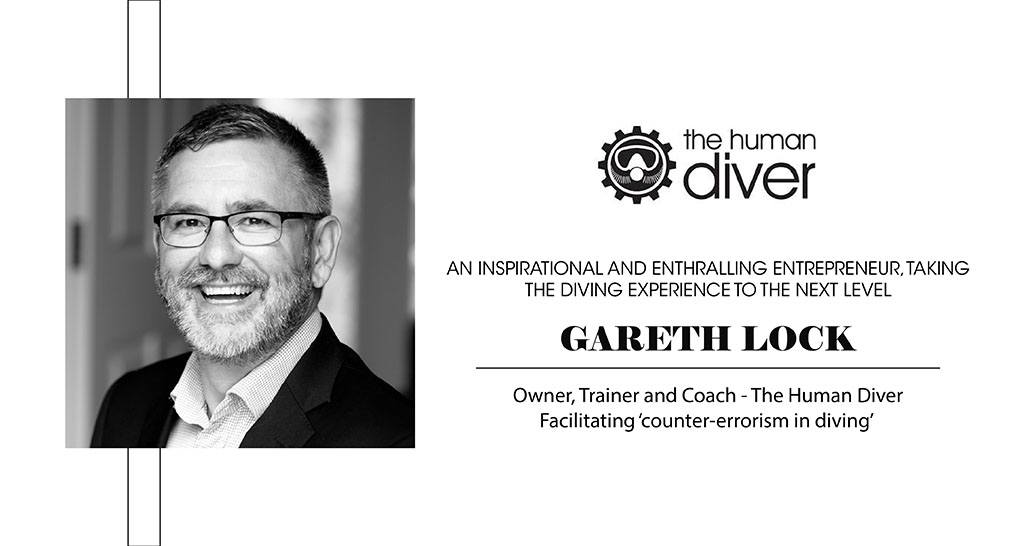There are numerous business leaders trailblazing ideas and leading their domains, but how many are driving change for their community as a whole? One leader of such extraordinary qualities is Gareth Lock, the creator of The Human Diver, a niche organization offering courses, training, and support for those who want to be the new pioneers in diving excellence. Gareth has trained numerous instructors worldwide in human factors and his mission to “apply human factors. Master the Dive” is at the heart of his work; his tagline, ‘Counter-Errorism in Diving’, summarizes what he and his team do.
The Man Behind Distinct Experiences: Gareth’s Inspirational Journey
Gareth Lock began diving in 1999, when he was on holiday. He didn’t want to spend time lying on the beach, so he started diving. He loved the water, but he had never gone diving. When he went to document the final dive in his logbook, he went to note the depth of 24 meters, but his instructor told him he couldn’t write that as the maximum depth on the course was 18 meters and this would be a breach of standards.
Five years after that first opportunity, he was in South Africa on his Aerosystems Course (ASC), a Master of Science degree; he and his friend had the chance to go diving over the weekend close to Cape Town. There was no checkout dive, and no one reviewed his certification card, both of which are breaches of good practice and expected standards. The following month, he was in San Diego with the course, and he went diving over the weekend. Gareth booked a guide on Saturday and had three fantastic dives, going up to the 18-meter certification limit and exploring the reefs and underwater sea life.
On Sunday, there wasn’t an opportunity for a shallower dive, so he persuaded a different dive operator to let him and his buddy out on a dive to 30 m. While the buddy was certified to this depth, Gareth was not. During the descent to 30 m, Gareth experienced an equipment malfunction, which meant he had no buoyancy control and sank to the seabed. Gareth knew the bottom was there, so he wasn’t worried. He and his buddy solved the technical malfunction, swam around, and made a safe ascent. They then had an uneventful second dive. This was a classic example of ‘I didn’t know what I didn’t know.’, says Gareth, explaining that he shouldn’t have been on the dive and had miscalculated the risks present. When he returned to the UK, he wanted to know how to report this near miss but found that the process was more complicated than what he had known and experienced as an aircrew in the RAF.
Over the following six years, he studied more about human factors, crew resource management (CRM), incident reporting, and non-technical skills (NTS) because he knew that the diving industry lacked such knowledge. To validate his beliefs and show this knowledge and practice were needed, he started a part-time, self-funded Ph.D. at Cranfield University in 2012 but gave it up after 6 years (2018) as he wasn’t getting support from the industry or the university, and it was costing him money. More importantly, though, he had also started teaching human factors classes to divers, using a computer-based simulation to bring the theory to life, and this was providing the validation he needed to carry on doing what he was doing. His passion has always been to introduce human factors into the diving industry because many aspects of the science of human factors are present in all accidents, incidents, near misses, and successful diving activities. He left the RAF in February 2015 to begin teaching in this field.
The Inspiration Behind the Human Diver
The incident Gareth Lock had in San Diego triggered him a lot. The more he studied the need for the different aspects of human factors (non-technical skills, psychological safety, and just culture), the more he realized that the diving industry lacked this knowledge, abilities, and the different perspectives needed to learn, not blame, following an unexpected event. As he started to teach these courses and give presentations, graduates from classes and conference attendees would give him positive feedback that this different perspective was needed, as the same mistakes were being made. It isn’t enough to tell people not to do ‘bad’ things; telling them what ‘good’ looks like is also required. Success isn’t just about having good technical skills, e.g., buoyancy control, trim, or using your diving equipment; more is needed. The social and physical environment influences the decisions and team interactions that are made; luck always has a little part to play in good outcomes; and non-technical skills like decision-making, situation awareness, communication, teamwork, leadership, and followership all contribute to successful or unexpected outcomes. These non-technical skills are rarely covered explicitly in diver training agency materials, and the context is easy to brush away.
Establishing a Safer and More Effective Diving Environment
Following several seminal events in aviation, cockpit resource management was developed to improve communication and assertion skills; this evolved into crew resource management, which stepped outside the cockpit to include the cabin crew. The goal of applying the skills associated with CRM and NTS is to create a shared mental model of what is happening now and what is likely to happen next, and that everyone can and should speak up when something isn’t right. This sharing of what is going on and concerns team members might have is made possible by fostering a psychologically safe environment. If team members don’t feel included, don’t feel like they can make a mistake, or can’t contribute, then they aren’t going to be able to challenge others in the team, and a speak-up or challenge culture is what modern businesses want and need. Psychological safety enables effective communication. Effective communication promotes situation awareness, thereby enhancing the speed and accuracy of decision-making.
The Remarkable Evolution of the Mission
The mission has evolved from conducting training sessions with intrinsically motivated individuals, where Gareth would deliver the training, to developing a team of instructors around the globe who can provide training and education to the global diving community. The training materials and blogs have evolved from having a more academic perspective to one that is more practically grounded and focuses on problems or queries that divers often face. Through the release of the book ‘Under Pressure’ and the documentary ‘If Only…’, the power of storytelling has also been explored as a way for divers to connect with the idea that events are not linear, with simple cause-and-effect relationships, but that multiple factors exist and the only way to explore them is through context-rich storytelling. A larger number of people can receive training at once through self-paced online and live webinar-based classes, which further propagates the concepts and ideas. So far, over 500 people have been trained face-to-face, more than 2500 people have access to the Essentials of Human Factors in Diving, and more than 150 people have participated in the live webinar series.
Emphasizing human behavior and team dynamics
The programs Gareth offers are not about the technical skills needed for diving, i.e., buoyancy, propulsion, trim, and using dive equipment, but rather the non-technical skills needed for successful outcomes. These technical and non-technical skills are interdependent. Technical proficiency increases one’s mental capacity to perceive what is happening around them and what is likely to happen, which then helps them improve their technical skills and so on.
Instead of training them to be expert astronauts during his space-based simulations, Gareth focuses on making them productive team players. Learning is maximized through the rapid iterations of planning, briefing, executing, debriefing, developing optimizations for the next round, and then repeating. A term he calls ‘High Velocity Education’. The feedback has been very positive, with a recent graduate describing the training as “very introspective; be prepared to feel utterly unraveled but unconditionally supported at the same time!”
Planning to touch new heights
The ultimate objective of The Human Diver is not to engage in a lot of “user-level” training within the diving industry; rather, they have three goals: to collaborate with course administrators and instructors to advance their expertise, which will then allow this knowledge to be passed on to the next generation of instructors and divers; to embed the concepts and tools into the training materials of training agencies; and to change the perspectives in the wider diving community to one where learning from unexpected outcomes is the norm, rather than blaming divers and instructors for making the mistakes they do.
“We are already expanding into other areas of diving like commercial diving, military diving, and scientific diving, and there is a huge opportunity there. Other areas include ROV, submersible operations, and space analogs,” remarks Gareth Lock.
Mob: +44 7966 483832
W: www.thehumandiver.com
E: gareth.lock@thehumandiver.com
LinkedIn: https://www.linkedin.com/in/garethlock/










